

What is The Salvation Army?
The Salvation Army is a Christian church and registered charity seeking to share the good news of Jesus and nurture committed followers of him. We also serve people without discrimination, care for creation and seek justice and reconciliation. We offer practical support and services in more than 700 centres throughout the UK. Go to salvationarmy.org.uk/find-a-church to find your nearest centre.
What is the War Cry?
The Salvation Army first published a newspaper called the War Cry in London in December 1879, and we have continued to appear every week since then. Our name refers to our battle for people’s hearts and souls as we promote the positive impact of the Christian faith and The Salvation Army’s fight for greater social justice.
Editor: Andrew Stone, Major
Deputy Editor: Philip Halcrow
Staff Writer: Emily Bright
Staff Writer: Claire Brine
Staff Writer: Ewan Hall
Editorial Assistant: Linda McTurk
Graphic Designer: Mark Knight
Graphic Designer: Natalie Adkins
Email: warcry@salvationarmy.org.uk
The Salvation Army
United Kingdom and Ireland Territory 1 Champion Park London SE5 8FJ
Tel: 0845 634 0101
Subscriptions: 01933 445445 (option 1, option 1) or email: subscriptions@satcol.org
Founders: Catherine and William Booth International leaders: General Lyndon Buckingham and Commissioner Bronwyn Buckingham
Territorial leaders: Commissioners Jenine and Paul Main
Editor-in-Chief: Major Julian Watchorn
weekly by The Salvation Army
The Salvation Army United Kingdom and Ireland Territory ISSN 0043-0226
The Salvation Army Trust is a registered charity. The charity number in England, Wales and Northern Ireland is 214779, in Scotland SC009359 and in the Republic of Ireland CHY6399. Printed by CKN Print, Northampton, on sustainably sourced paper
Many people may feel that health advice has taken a step in the right direction this summer in terms of how much walking we should be doing every day.
For years, a daily total of 10,000 steps was given as the target to hit if we wanted to gain all the health benefits that keeping active can bring – but many of us found it hard to achieve. However, last month media outlets reported on a new study that suggested that walking 7,000 steps a day could be enough to boost our brainpower and help protect against conditions including cancer, dementia and heart problems.
Whatever daily target we may set ourselves, there seems to be no doubt that stepping out is good for us – and not just for our physical health. Lots of people find walking good for their mental wellbeing, and there are Christians who say that a stroll in the natural world helps them to connect with the God who created it all.
In this week’s War Cry we speak with Andy Kind, who has written a book about his experiences of walking the Pennine Way. It took him 16 days to complete the 268-mile trek from Derbyshire to the Scottish Borders.
‘I had lots of people walking with me over the course of the route,’ he tells us. ‘As you meet other people on the path, you’re having that shared experience.’
As well as recording these encounters, Andy’s book reveals how the gruelling trip had an effect on his Christian faith.
He tells us: ‘The book is about being reliant on God and refusing to give up’.
It’s not just when Christians are physically exhausted that they find themselves relying totally on God. They know that they can turn to him when they face challenges of any type – because they trust that he will help them every step of the way.





DAYLIGHT ROBBERY
Detectives investigate jewellery store theft and murder
TV preview: Ridley Sundays ITV1 and ITVX
By Emily Bright
Three years on from an arson attack that killed his wife and daughter, Alex Ridley (Adrian Dunbar) is in therapy and throwing himself into work. In the second series of Ridley, the retired detective inspector reprises his role as police consultant to his former protégé, DI Carol Farman (Bronagh Waugh).
Farman’s latest case is an armed robbery at a jewellery store. As the thieves fled the scene on mopeds, one of the young men fell off into the road and was detained by police – a crucial first lead.
The suspect Ryan Stanford (Ruaridh Mollica) – who faces 10 years in prison for possession of an offensive weapon – is ready to co-operate until the unexpected arrival of his lawyer keeps him quiet. Frustrated at his noncompliance, Farman charges him and he is remanded in custody until his court hearing.
On leaving court, Ryan is spooked by seeing someone he knows. He sprints away from them. But before he can escape, a vehicle slams into him at high speed, killing him in a hit-and-run.
One of the prime suspects in both crimes is a known associate of Ryan, Liam Manley (Kerim Hassan). But as the investigation unfolds, other suspects emerge.
Shortly before he died, Ryan made a phone call. Ridley believes that tracking down the person he called could provide answers on the robbery and hit-and-run. It also transpires that Ryan’s lawyer was employed by someone who was previously charged with handling stolen goods.
To complicate matters further, the police receive a tip-off about a criminal accomplice of Liam’s, Callum (Kaya Moore), who was in close proximity to the courthouse when Ryan was killed.
All those under investigation seem to know more than they’re letting on. For Ridley and Farman, it’s a case of working out whose story to trust and which leads to follow.
Viewers can perhaps relate to the difficulty of knowing who to trust –particularly if they have been let down in the past. Sometimes even those closest to us can disappoint, deceive or hurt us. But there is someone who we can fully rely on,


who will never fail us: God.
Such a belief can be traced back to the Bible, which says: ‘It is better to take refuge in the Lord than to trust in man’ (Psalm 118:8 English Standard Version).
The words are a clue that people can be fallible and untrustworthy – but that God can be relied upon as a consistent, faithful and true source of strength, who can see us through all of our greatest challenges.
If we put our trust in God, we can experience his unfaltering support for us in good times and bad – which is something worth its weight in gold.
Alex Ridley is back solving crimes
Callum and Liam WEST
Sorry, not sorry?
Sarah Olowofoyeku gives her take on a story that has caught the attention of War Cry reporters
Sorry seems to be the hardest word for Britons, writes Olivia Petter in The Independent She quotes research, commissioned by the language-learning platform Babbel, which found that British people have 15 uses for the one word –and many of them don’t reflect its true meaning.
Some of the uses are ‘to ask someone to move out of the way. To ask someone to repeat themselves. To show empathy. To express disbelief. To disagree. To mock.’
The problem with the overuse of the word, she says, ‘is that now we’re unsure how to apologise properly for something that actually warrants remorse’.
The truth is that we are human and imperfect
In her article, Olivia explores why it’s psychologically difficult to apologise. She says it is because apologising threatens our sense of identity; and because our brains are designed to protect us by seeing ourselves as good people. It can also bring up feelings of shame. She goes on to explain that to apologise effectively, we must ‘name the behaviour, acknowledge the impact, and offer repair’. It can still be difficult to accept that we have done something wrong, especially because most things we do can’t be undone.
It’s something I struggle with, but the truth is that we are human and imperfect, so getting things wrong and even causing harm is inevitable.
Hard to hear, but it sets the scene for one apology that changed my life, and can change anyone’s. The one that we have most wronged by our behaviour is God. He created us to be in relationship with him, but human nature means that we are often against him.
To restore that relationship – a move that offers us peace and joy now, and a perfect life after we die – all we need do is name our behaviour to God, then acknowledge the impact. And the repair? God took care of that by sending his Son, Jesus, to die for us, freeing us of guilt and shame and inviting us into new life with him – not as good or bad people, but as people who are deeply loved.
It isn’t necessarily easy to say sorry to God, but it is more than worth it.
talk talk Team talk Team talk ‘ ’ j TEA M TALK
WAR
Little faith on streaming platforms
Public service broadcasters are failing to make content about religion visible and easily accessible on their streaming platforms, according to research carried out by Leeds University.
The study assessed the availability, accessibility and prominence of the arts, international issues and religion on BBC iPlayer, ITVX, Channel 4 and Channel 5. It found that these ‘key genres’ were largely absent from the streaming platforms, were rarely recommended by the platforms and were hard to find through search tools. Even basic search functions performed poorly. A search on ITVX for ‘Islam’, for instance, returned no relevant content but instead suggested entertainment titles such as Love Island.
The research – carried out in association with the International Broadcasting Trust, the Sandford St Martin Trust, which supports religious and ethical broadcasting, and the Campaign for the Arts – also found that algorithms rarely promoted content on religion and other key areas unless users had already watched similar material.
In a report, Behind the Screen, the researchers and contributing authors argue that programmes about the arts, international issues and religion play a ‘vital civic function’ by building understanding and empathy in a diverse world.
The report recommends that public service broadcasters should be incentivised by the government to broaden their content, and that they should be required to set out the principles and values underpinning the algorithms they use on their streaming platforms.
WAR CRYWn
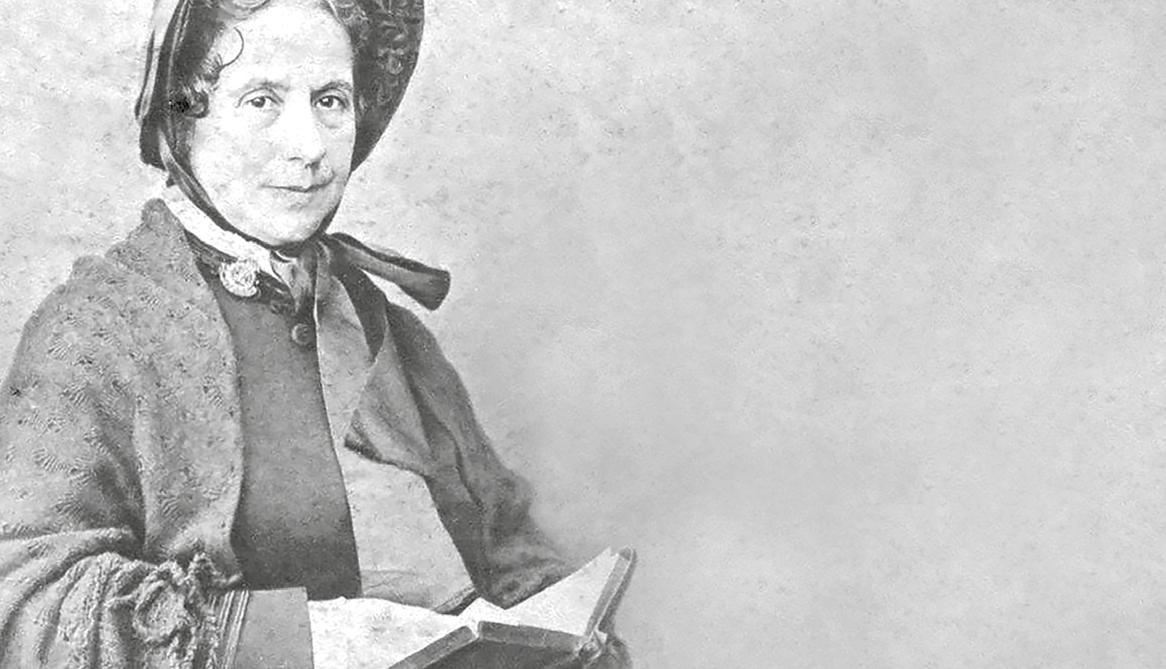
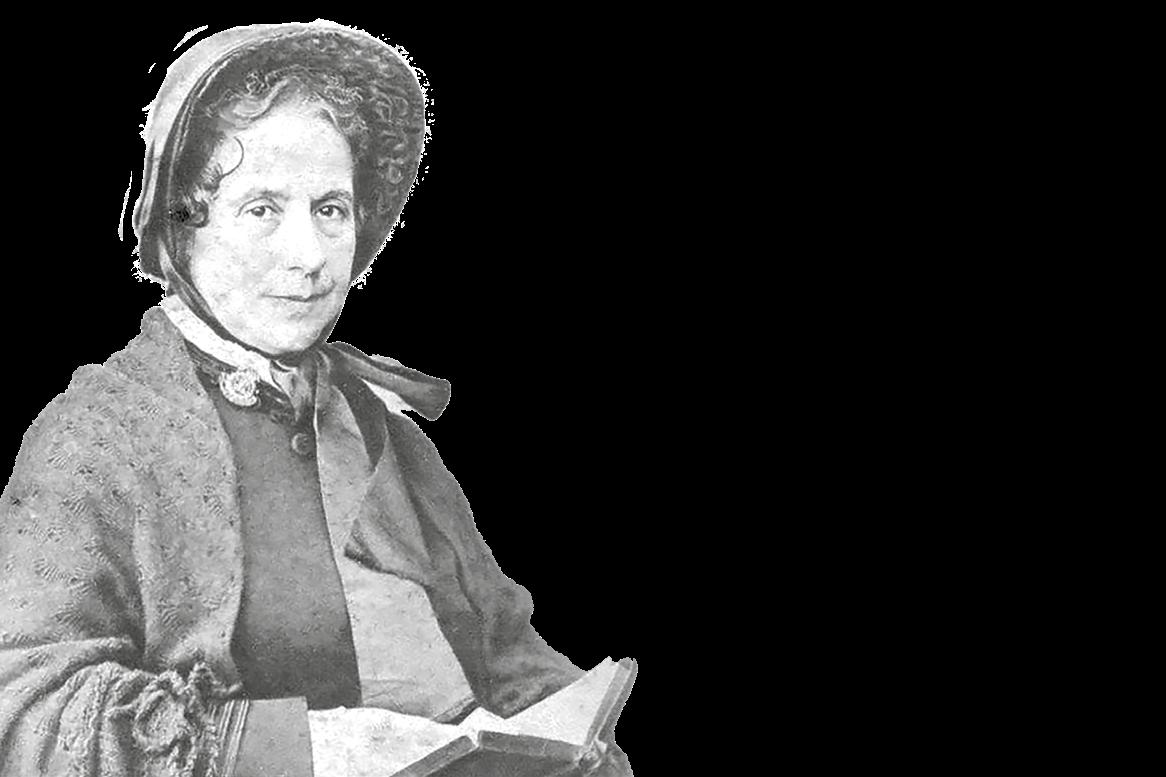

New strategy for freedom of religion
The government has set out a new ‘framework for action’ with the ‘overarching goal’ to reduce the number of countries around the world where people are not free to practise the religion or beliefs they choose.
Announced by David Smith, the UK’s special envoy for Freedom of Religion or Belief (FoRB), during an event at the Foreign, Commonwealth and Development Office (FCDO), the framework says that the government aims to:
● uphold FoRB within international institutions such as the UN;
● employ diplomatic networks to focus on encouraging changes in behaviour and legislation in 10 countries, among them Syria, Afghanistan, Algeria and Nigeria;
● strengthen international coalitions;
● make FoRB efforts as an essential part of FCDO work and engage with human rights organisations and civil society groups.
Chibuzor Tina Amadi of campaign group Christian Solidarity Worldwide welcomed the government’s strategy, commenting: ‘FoRB considerations should be integral to how the UK engages globally – not just in humanitarian aid, but also in areas such as trade, security co-operation and development partnerships.’




Increased church attendance brings good news
‘A blessing for the nation’ was the opinion of the Sunday Express when it responded to the news that there is evidence of a ‘spiritual awakening’ in the UK.
Commenting on Bible Society’s Quiet Revival report, which revealed an increase in the number of people attending church services, the newspaper said: ‘Instead of the toxic combination of narcissism and public shaming which defines so much of the digital world, here are communities which prize not just forgiveness but reconciliation; not just tolerance but fellowship.’

ROLL UP FOR A MAGICAL HISTORY TOUR
At Strawberry Field, day-trippers, holidaymakers and local visitors find a place that is not only part of Beatles history but is also still aiming to do good in the community
Feature by Philip Halcrow
Here comes the sun. Perhaps. And, with many people looking to make the most of the summer (whatever the weather), here comes the opportunity for Beatles fans to spend time at a site that inspired one of the group’s hits.
When John Lennon was growing up nearby and playing in its grounds, Strawberry Field in Liverpool was a
Salvation Army children’s home. Today it is no longer a children’s home, but it is still a Salvation Army site that aims to make life better for young people. It is also a visitor attraction, offering an exhibition, a café and a chance to wander in the grounds that influenced John’s writing of the Beatles’ ‘Strawberry Fields Forever’, a double A-side single with ‘Penny Lane’ in 1967.
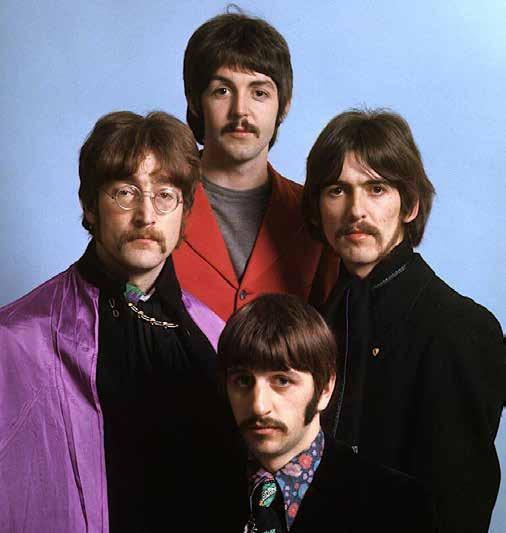
‘People come to Strawberry Field from all over the world,’ says the site’s mission director Major Michelle LovegroveHuggins. ‘Some local people come regularly for the fabulous breakfast we do in the café, but we also have people from all over the UK and from the US, Australia, Japan, China and Latin American countries.
‘We’re a global attraction – you never know from one day to the next who you’re going to meet and where they’ll be from. Usually they are Beatles fans.’
They make tracks to Strawberry Field to ‘stand in a space where they know that John has been’, says Michelle.
‘He used to sneak over the wall to play in the trees and play football on the grass. He had a difficult childhood, but this is somewhere he felt safe. So people come because John used to find sanctuary here and because of the song that he later wrote.’
Michelle suggests that visitors who are drawn to Strawberry Field tend to spend anything from one to four and a half hours experiencing what it has to offer.
‘There is an exhibition which tells
John, Paul, George and Ringo in 1967, the year they released ‘Strawberry Fields Forever’
MajorMichelle
Lovegrove-Huggins


‘Imagine’
the story of The Salvation Army and Strawberry Field when it was a children’s home and how that history intersected with the Beatles story, from John Lennon’s visits to the writing of the song,’ she says.
‘The exhibition has artefacts such as limited edition vinyls by John that were donated by Yoko Ono and Sean Ono Lennon. We also have the “Imagine” piano – not the big white one in the video, but the one on which John wrote the song. It was purchased by George Michael – who also wrote the song “Patience” on it – and it’s on indefinite loan from his estate, because they wanted it to be where people could see it rather than it being hidden away somewhere.’
The interactive media guide that takes visitors through the exhibition can also lead them into the gardens that were a childhood haunt of John’s.
Today, the grounds include a bandstand – its design based on the drum on the cover of the Beatles’ Sgt Pepper’s Lonely Hearts Club Band album – which hosts concerts. They are also a temporary home for a Ukraine Peace Monument, taken to Liverpool when the city stood in as a host for
the Eurovision Song Contest after the Eastern European country was invaded by Russia. And they feature a ‘prayer labyrinth’, a path of stepping stones which people can walk while they meditate on the figurative path they are taking through life.
We are in a busy city, but it’s a tranquil place
‘The grounds are a place for contemplation,’ says Michelle. ‘We are in the middle of a busy city, but it’s a tranquil place. Even when there are busloads of people walking around it still feels like a haven.’
The summer is a busy time at Strawberry Field. To coincide with Liverpool’s annual International Beatleweek later this month, the site will be putting on events by local choirs. It has also brought back the summer fêtes which the young John Lennon used to attend with his Aunt Mimi.
But it is open to the public all year round. And all year round, the money spent by visitors on tickets, food and drink in the café and merchandise helps fund the site’s work of providing training
for young people who face barriers to employment. Strawberry Field’s Steps to Work programmes help trainees –who may have learning disabilities or be struggling with their mental health –to develop skills, such as CV-writing, budgeting and confidence in using public transport, which they will be able to use at a workplace and in wider life.
‘We provide work placements at Strawberry Field itself for those who are going through the programmes,’ says Michelle. ‘So, if you’re in the café, very often it will be somebody from our Steps to Work programmes who will be serving you.’
By working with young people, highlighting its history and opening up the grounds as a place of sanctuary where people can reflect and pray, Strawberry Field is still living out the Salvation Army mission of putting Christian beliefs into action.
‘We are not only about our Beatles associations but about doing good in the community,’ says Michelle.
‘People come looking for John, but hopefully they will find something out about Jesus along the way.’
And that’s an invitation to make a reservation.
Visitors to Strawberry Field can see the piano on which John Lennon wrote
You’ll never
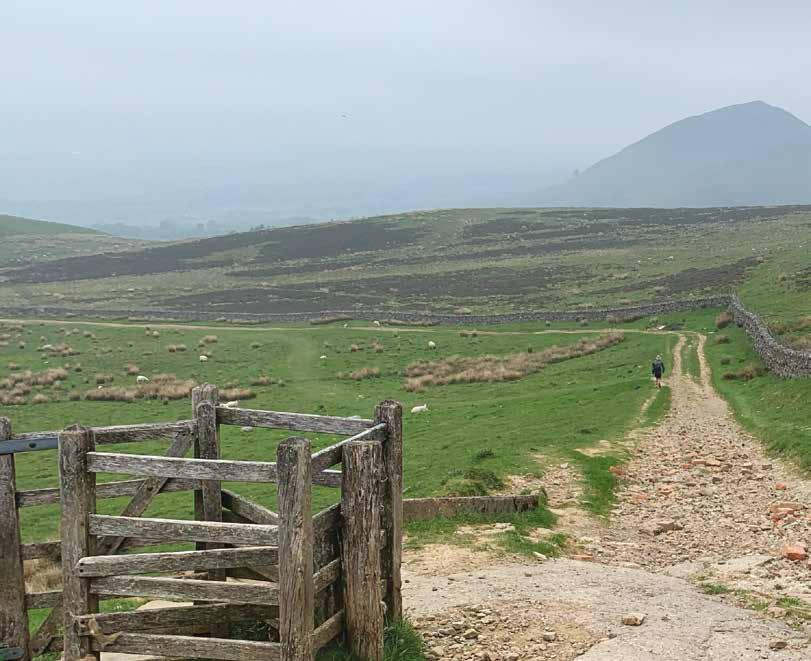


AAuthor and comedian ANDY KIND reveals what he learnt by trekking the Pennine Way and how a story of redemption has changed his life
Interview by Emily Bright
fter emerging from the UK’s lockdown lethargy, stand-up comedian and author Andy Kind was craving a new adventure. The Pennine Way – a 268-mile walking trail which starts in Edale, Derbyshire, and ends at Kirk Yetholm in the Scottish Borders – seemed to fit the bill.
Andy had a sentimental attachment to the route – he proposed to his wife near its starting point. And, after two unsuccessful attempts at walking the trail, he was determined to complete it. In May 2021, he set out on his 16-day quest, which is the subject of his new book, The Wayfarer
Reflecting on his latest writing project, Andy – whose previous books have included the novel The Gig Delusion and the autobiographical Stand Up and Deliver – says that he sees parallels between storytelling and walking.
‘There’s something about walking which satisfies some basic human needs of purpose and progress,’ he says. ‘We all need a purpose and to feel that we’re making progress towards it. And all stories are about a character trying to achieve their aim, and how he or she gets there.’
Andy sees his own book’s narrative of purpose and progress as centring on a man who ‘loves Jesus’ but also finds himself ‘in the mire’. He felt it essential to be honest when revealing the challenges of walking the Pennine Way, and how he depended on God throughout.
‘The book is about being reliant on God and refusing to give up – not because I wanted to be an alpha male, but because I wanted to see something end in victory rather than defeat.
‘There are lots of other stories, both fictional and real-life, where protagonists
seem not to win, or at least not initially. My writing is about how we find hope and how we cling on to the idea of redemption, even when death, despair and hopelessness seem to win.’
Andy began trekking the Pennine Way in the knowledge that he would write a book about his travels. He sought divine inspiration for his storytelling, and God responded in unexpected ways.
Andy recalls: ‘I prayed: “Lord, I want this story to be true. Please will you help me out with that?” On day three, I stayed in the weirdest Airbnb I’ve ever known. Although it was an absolute nightmare, I came away thinking: “Well, that’s the book.”
‘There’s no story without drama. I just knew that anything weird or bad that happened would be going in the book, including blacking out at the foot of Peny-Ghent, twisting my ankle and staying
Andy Kind
walk alone

with a weird Austrian couple.
‘These experiences add a sense of jeopardy, because the reality is that walking is quite boring. I’m not writing a travel guide, so no one wants to hear too much about the environment. You’ve got to set the scene, but once the scene is set, it’s really about me trying to get what I want and the other people that I meet.’
And the people he met on the Pennine Way play a central role in The Wayfarer.
‘I had lots of people walking with me over the course of the route,’ he remembers. ‘My friends Jon and Phil were there for a bit at the start, and they were great. Having that camaraderie on the first day was really helpful, because walking can be an isolating experience. It can be a bit discombobulating when you’ve come out of civilisation and you’re in the middle of the wilderness.
‘Throughout the walk I had people
join me that I met on the way. I think emotions are always more appreciated when drawn on the faces of other people.
As you meet other people on the path, you’re having that shared experience. You are doing something together which is hard and are helping one another.’
Alan normally sits on the mantelpiece
Andy encountered a diverse range of people on his travels, from the down to earth to the downright eccentric. He met generous-hearted maternal figures and witty pals.
‘The main characters I met on the walk were sometimes different from the people I knew before or that I would normally be with,’ he says. ‘It was good to see other people’s reactions to what was
going on, and to the hardship, rest and recuperation.’
Andy had another faithful sidekick during his adventure: Alan – a novelty doorstop fox.
‘Alan is around somewhere,’ he chuckles. ‘He normally sits on the mantelpiece. When I started walking the Pennine Way, I wanted to have a mascot. I wanted to have something to cuddle or to just be quirky. I found Alan in my cupboard. He became a motif and a symbol for deeper stuff.
‘In terms of the storytelling of the book, Alan was a foil to talk to. He was the Wilson to my Tom Hanks in Cast Away, the Aloysius to my Sebastian Flyte in Brideshead Revisited.’
Despite the support of Andy’s trusty
Turn to page 10 f
A view of the Pennine Way
mascot – who brought some welcome levity – traversing the Pennine Way was gruelling. Yet in hindsight, Andy says that the trip taught him about the ‘positive nature of endurance’.
‘I only enjoyed it once I’d finished it,’ he says. ‘But I knew I needed to finish. My only real concern was putting my next foot in front of the other.
‘On the penultimate day, I twisted my ankle and went into a bog, which was a disaster. And I thought: “I’ve come so far and this is it.” We live in a victim society, where we’re encouraged to live in our brokenness and to blame everybody else for our negative feelings. But I wanted to rub against that grain.
‘Doing so was partly about stoicism, but also it’s what it means to follow Jesus. You will cross the finish line, but there’s stuff on the way that you just have to put up with. God is not afraid to let us take a few wounds, but – as the Bible says – by his wounds, ours are healed.’
Walking the Pennine Way was not just about achieving a physical feat. It also offered Andy the time and headspace to process his thoughts, which particularly came into focus near the end of his trek.
‘On the final day, I walked completely on my own, and I wouldn’t have had it any other way,’ he says. ‘I started with other people, but I wanted to finish on
my own. It’s a strange thing that walking or any kind of pilgrimage does – you end up not just being happy in your own company, but also content with your lot.’
After Andy completed the Pennine Way, he had an opportunity to write in the walkers’ book. Initially he was stumped about what to write, so looked in the Bible for inspiration.
‘I found Psalm 40, which says: “He lifted me out of the slimy pit, out of the mud and mire. He set my feet upon a rock and gave me a firm place to stand.” That not only literally describes the Pennine Way, and finishing it, but also what Jesus has done in my life.’
There isn’t another story like the Gospels in the cosmos
Jesus has been part of Andy’s story for many years. Growing up in a Christian home, he has always believed in God. But he says that he ‘didn’t pay much heed’ to faith in his teenage years, before he was drawn back at the age of 22.
‘When I came out of university and had made a good first attempt at shipwrecking my life,’ he explains,
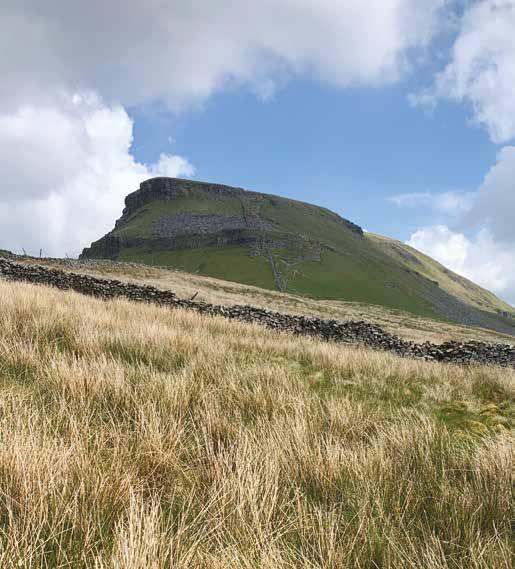

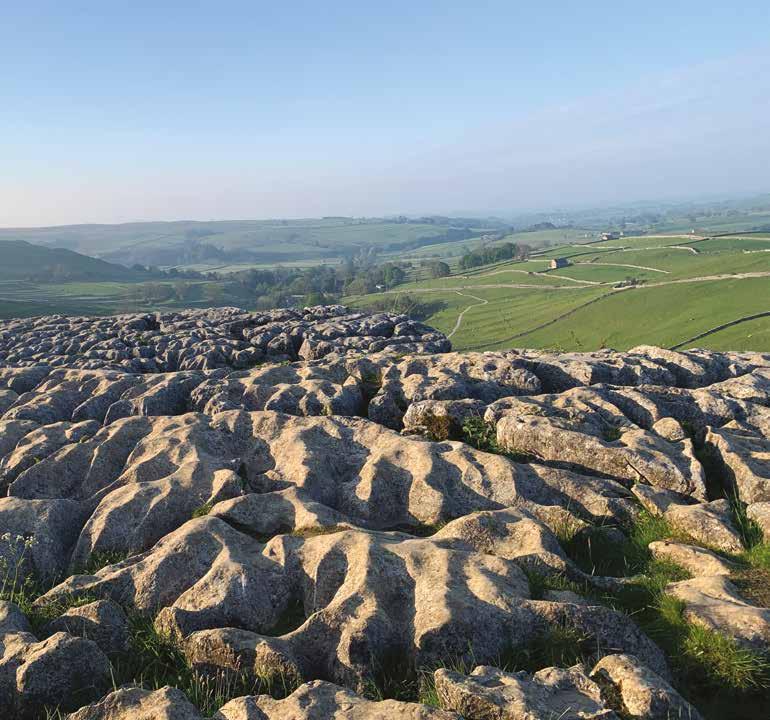
‘I realised that something had gone missing, and it was the faith of my youth. At that point, I went from being a fan of Jesus to deciding to stick closer to him.
‘There’s only one safe space to be in the universe spiritually, and that’s next to Jesus.’
Andy believes that the Gospels, which tell the story of Jesus’ life, are a uniquely hopeful story in the face of suffering.
‘The Creator of the universe knows you by name, is with you at all times, and is both with you in the grave and knows the way out – there isn’t another story like that in the cosmos which offers that sense of hope and promise.
‘In any story, the happiest ending is always in comparison to the lowest
depth. If we look at the resurrection of Jesus, it’s amazing. But without the Crucifixion, the Resurrection is just a man leaving a cave. Jesus had to plumb the depths of hell for the Resurrection to be the greatest event of all time.’
The story of Jesus resonates with Andy because he can relate to its redemptive message.
‘It’s the same with any story and any life,’ he says. ‘You appreciate the mountain peaks because of the valley floors. In the context of my faith, I absolutely believe what the Bible says that in the end, every tear will be wiped dry and that the universe will have its redemption.
‘I choose to believe that we are
“flawed but adored” – which for me is the gospel in three words, and means that I can keep trudging on, no matter the scenario.
‘Knowing that there is a God who loves justice, hates inequity, loves a redemption arc and has wired that storyline into the universe – that is the path that my entire life’s walk has been carried out on.’

l The Wayfarer is published by Rowley Wise
Prayerlink
The War Cry invites readers to send in requests for prayer, including the first names of individuals and details of their circumstances, for publication. Send your Prayerlink requests to warcry@salvationarmy.org.uk or to War Cry, 1 Champion Park, London SE5 8FJ. Mark your correspondence ‘Confidential’.
jBecoming a Christian
There is no set formula to becoming a Christian, but many people have found saying this prayer to be a helpful first step to a relationship with God
Browsing the Bible
Nigel Bovey gives chapter and verse on each book of the Scriptures
Joel
Little is known about Joel, a prophet to the southern kingdom of Judah. Unlike many biblical books of prophets, his contains no date references.
When he witnesses a plague of locusts devouring crops, Joel is inspired to see a parallel between the agricultural devastation and a military ruination of Judah to come (chapter 1).
Like an early warning system, he announces: ‘The day of the Lord is near’ (1:15). ‘The day of the Lord is coming. It is close at hand’ (2:1 New International Version). ‘The day of the Lord is great; it is dreadful’ (2:11).
On that day, Joel says, an invading army will slash and burn its way through the land of Judah and into Jerusalem, destroying everything, locust-like, in its path (2:1–11).
Lord Jesus Christ,
I know that I have done things in my life that are wrong and I’m sorry. Thank you that I can ask you for forgiveness because of the sacrifice you made when you died on the cross.

Please forgive me and help me to live a better life in the future as I learn how to love you and follow your way of living.
Thank you, Lord Jesus.

Joel urges Judah in response to show repentance by putting on sackcloth, by fasting and by meeting together for prayer (1:13 and 14; 2:12–17). He encourages the people to change their hearts. ‘Return to the Lord your God,’ he says, ‘for he is gracious and compassionate’ (2:13).
If they do so, God will take pity on them, drive the invaders away and restore the land’s fertility (2:19–27).
He will also renew his people spiritually. Everyone will be included. He will pour his Spirit on young and old, male and female. Everyone who calls out to the Lord will be saved (2:28–32). Many scholars regard the Day of Pentecost, when Jesus’ disciples were filled with the Holy Spirit (Acts 2), as the ultimate fulfilment of this prophecy.
Scholars also think that the ‘day of the Lord’ in chapter 3 is an apocalyptic vision of the end times. When the time is right, God will gather all nations together in the Valley of Jehoshaphat (3:2), which separates Jerusalem from the Mount of Olives. There, he will judge them for their treatment of his people (3:12–16).
In that day, Judah will be at peace, verdant, fertile and forgiven (3:17–21).

If you’ve prayed this prayer, scan the QR code or contact us using the coupon on this page











Name










Address



































To receive basic reading about Christianity and information about The Salvation Army, complete this coupon and send it to





War Cry 1 Champion Park London SE5 8FJ a

Or email your name and postal address to warcry@salvationarmy.org.uk




















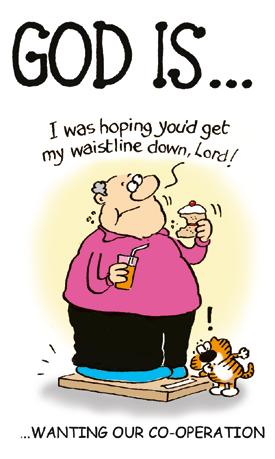
QUICK QUIZ
1
Who played Sheldon Cooper in the US sitcom The Big Bang Theory?
2 Which former New Zealand prime minister recently published her memoir A Different Kind of Power?
3 In which decade was the first Mario Kart game, Super Mario Kart, released?
4 Balliol, Keble and Oriel are colleges of which university?
5 What colour is the dragon on the Welsh flag?
6 Which part of a human cell contains the DNA?


Students are preparing to receive their A-level results
Feature by Ewan Hall
All the late-night revision sessions, colour-coded notes and essays will come to their culmination on Thursday (14 August) when students in England, Wales and Northern Ireland receive their A-level results. The grades that the school-leavers get could shape their university options, career paths and future ambitions.
Despite Jeremy Clarkson’s annual social media post about his own results way back when – a C and two Us – and how well his life turned out, today’s teenagers may still feel stressed while making their way to school or college to pick up what many see as the most important news in their lives so far.
For two years, the young people have studied subjects in the humanities, sciences or arts. The results of their exams and coursework may determine which university they attend. Not having the grades to go to their first choice could feel to some like the end of a childhood dream.
It’s likely that anxious feelings will skyrocket until it is time for the students to be handed their results. Will the rest of their summer be spent looking forward to a university course or apprenticeship – or will it be a summer of scrambling through clearing to get back on track?
Life is full of moments that feel like turning points, whether we are receiving exam results, starting a job or beginning a new relationship. At such times it can be difficult to figure out what comes next – and in some cases, what should happen after a disappointing outcome.
But when things look uncertain, Christians take comfort in knowing that God is there to guide them. In doing so, they follow the advice of one Bible writer, who urged people: ‘Trust in the Lord with all your heart and lean not on your own understanding’ (Proverbs 3:5 New International Version).
If we choose to put our faith in God rather than going alone, we discover that, with his help, we can always be sure of getting the right result.

1. Two-footed animal (5)
4. Chocolate drink (5)
8. Cobbler’s tool (3)
9. Clean (5) 10. Fetch (5)
11. Rubbish container (3)
12. Regal (5)
13. Prisoner (7)
16. Carry too far (6)
19. Be cautious (6)
23. Menial (7)
26. Colloquialism (5)
28. Small child (3)
29. Shout of joy (5)
30. Israeli city (5)
31. Master (3) 32. Rendezvous (5) 33. Illustrious (5)
2. Social gathering (5)
3. Meddled (7) 4. Embrace (6)
5. Ship’s room (5)

6. Defence (5) 7. Power (5)

21. Rowing crew (5)
22. Ratify (6)
23. Drain (5)
24. Perch (5)
25. Smear with (5)
HONEYCOMB


Prepare for
27. Extemporise (2-3) PICTIONARY REVERSI SCRABBLE SNAKES AND LADDERS TRIVIAL PURSUIT
Brake system (5)
Pledge (3)
Motor (3)
Contend (3)
Engine turn (3)
Oriental (7)
Awl.
Scrub.
Convict.
Overdo.
Beware. 23. Servant. 26. Slang.
Tot.
Whoop. 30. Eilat. 31. Sir. 32. Tryst. 33. Noble.
2. Party. 3. Dabbled. 4. Clinch. 5. Cabin.
Alibi. 7. Might. 9. Servo.
Vow. 15. Car.
Rev. 20. Eastern. 21. Eight. 22. Attest.
Apply. 27. Ad-lib.
Vienna. 2. Caesar. 3. Income.
Pardon. 5. Debris. 6. Revise.


Moroccan-style roasted cauliflower salad
INGREDIENTS
½ cauliflower
5tbsp vegetable oil
2tbsp peri-peri seasoning
1tsp turmeric
150g leeks, halved lengthways and thinly sliced
300g squash, peeled and cubed
400g can chickpeas, drained
30g flat-leaf parsley, chopped
1 pomegranate, seeds
3tbsp cold-pressed rapeseed oil
80g rocket leaves
Salt and ground black pepper

METHOD
Preheat the oven to 190C/Gas Mark 5.



Rub the cauliflower all over with 3tbsp vegetable oil, ensuring that it is coated well. Sprinkle over the peri-peri seasoning and turmeric, then rub into the cauliflower. Place on a baking tray and put into the oven.

Cook the cauliflower until the leaves are blackened and the florets are soft. Remove from the oven and leave to cool for a few minutes.
Discard the leaves and base of the cauliflower, then chop the stalk and florets into small pieces. Set aside.
Heat the remaining vegetable oil in a pan and fry the leeks and squash, until lightly coloured and the squash is softening.
Transfer to a bowl and add the chickpeas and parsley, stirring well. Add the cooked cauliflower and mix again. Add the pomegranate seeds and rapeseed oil and toss together.
Place the rocket in a serving bowl and top with the cauliflower salad. Season with salt and pepper, to taste, before serving.
Lemon and oregano chicken skewers
INGREDIENTS
500g chicken thigh or breast, diced
10g fresh oregano, finely chopped
1 lemon,
METHOD
Preheat the oven to 180C/ Gas Mark 4.

Place the chicken in a bowl with the oregano and lemon juice and zest. Season with the salt and pepper, then stir to combine. Cover and leave to marinate for 1 hour in the fridge.
Thread the chicken on to 4 large skewers and



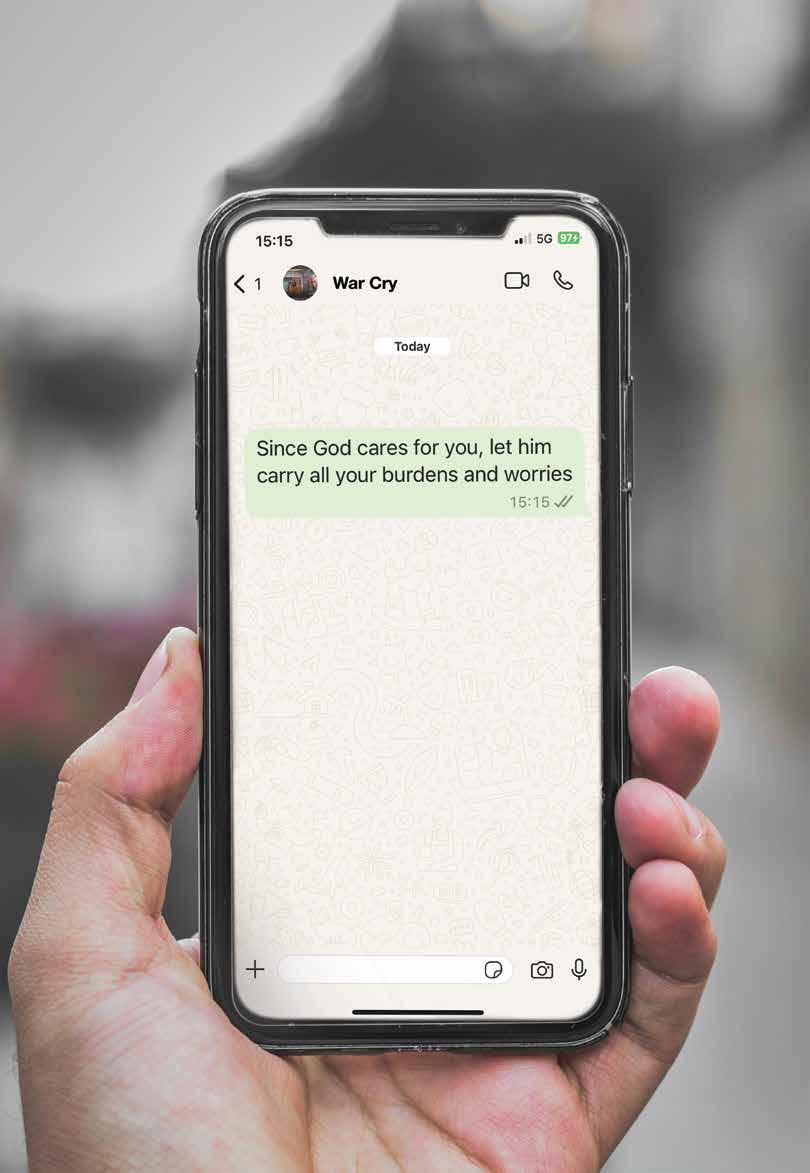
1 Peter 5:7 (The Voice)
